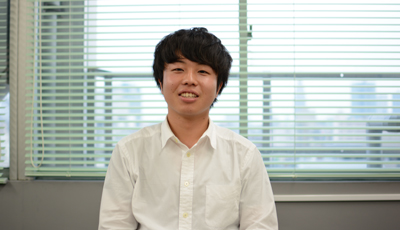
Wants to develop skills that can be of use in distressed regions
| Department of Civil and Environmental Engineering 4th year undergraduate |
| Yutaro Makino |

Q What sort of extracurricular activities do you take part in?
Last year I served as a representative of WASEND, the Waseda Student Organization for the Education of Natural Disaster. This group falls directly under the Department of Civil and Environmental Engineering. It was formed at the urging of Prof. Masanori Hamada, who retired last year.
The impetus for WASEND’s establishment was the 2004 Sumatra earthquake.
Knowledge about natural disasters is generally lacking in developing countries, which can contribute to increases in the resulting damage. Unfortunately, this also occurred following the Sumatra earthquake. Stressing the importance of disaster education on an everyday basis, Professor Hamada established WASEND with the intention of having students shoulder that mission.
Q What specifically does WASEND do?
We provide disaster prevention education to children. The topics are in two areas, one being explanation of the mechanisms that produce phenomena such as tsunamis and landslides, and the other being how to avoid hazards when a disaster occurs.
In Japan, we undertook such activities mainly at elementary schools and municipal disaster prevention events in various regions. Abroad, a trip we made to Indonesia was particularly memorable. Seeing things with one’s own eyes and listening to the stories of the natives makes you think about all sorts of things.
Q What sort of things did you think about?
Although we conducted disaster prevention education at elementary schools, Indonesia has great regional disparities in wealth, and not all children get to go to elementary school. Because of that, we weren’t able to teach children of poor households the importance of disaster prevention.
But when disaster strikes, it is actually the poorer people who are most affected. On the other hand, wealthier people continue to engage in development that is not needed by common folk. The contradiction of these circumstances caused me to wonder whether my research was meaningless.
The experience that freed me from this pessimism also took place overseas.
While visiting Ho Chi Minh City in Vietnam, I visited a subway construction site, and had an epiphany about the improvements in ordinary people’s live that come through infrastructure development.
Aims to cultivate many skills, and the capacity to see things through the eyes of others
Q Can you take advantage of that experience in your research?
At WASEND and during my visits to overseas sites, I learned how important it was to think about things from other people’s perspective. Bringing technology and equipment from Japan and pushing it onto others would be meaningless unless it fulfills some local need. Also, Japanese ways of thinking and what we regard as common sense can sometimes be an annoyance in other cultures. That means it is very important to fully understand local needs and to observe local values.
After returning from Indonesia, I took Prof. Junko Naito’s cultural anthropology class, which was very illuminating. I think studying subjects outside of one’s own field of specialization is a good way to develop versatility. It helped me to form a basis for “looking at things from the perspective of others, and understanding what people really need.”
So I believe the experience will be very helpful to me in the future.

